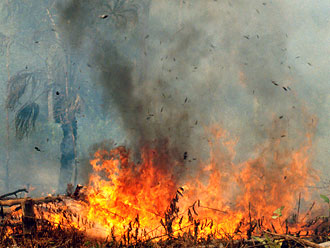
Worldwatch bericht: 'Warming Climate Linked to Runaway Blazes in Brazil's Rainforest Acre, Brazil’s westernmost state, is preparing for yet another onslaught of out-of-control forest fires following one of its driest rainy seasons in years.
According to George Woodwell, founder and senior scientist at the Woods Hole Research Center (WHRC) in Massachusetts, the systematic warming of the Earth is causing increased evaporation in tropical regions like Acre. “This effect is now becoming conspicuous in unusual droughts and fires in the normally wettest segments of the tropics,” Woodwell explains.
The current drought is a grim reminder of the devastating fires that occurred following similar warning signs last year. The Acre River, the main local water supply, is even lower than last year’s 34-year low. The meager water level indicates a lack of moisture in the subsoil, which makes the trees and other vegetation less resistant to fire, says Irving Foster Brown, who works in Acre with WHRC and the U.S. National Aeronautics and Space Administration (NASA). The blazes typically begin during the dry season when farmers burn their fields to clear debris and stubble. Experts expect the burning to quickly get out of hand, as it did in 2005 despite a government-imposed moratorium punishable by imprisonment.
Brown cautions local residents to actively prevent the type of destruction that resulted last year, including more than $80 million in direct economic losses, 200,000 hectares of fire-damaged forests, and 300,000 hectares of open burned areas. Brown predicts the damage will be even worse this year because the fire-affected areas will burn more readily. He is collaborating with the Acre government to map out the most severely burned regions in an effort to identify where fire-control activities will be most needed. Since 1990, average annual deforestation in the Amazon region of Brazil has reached 18,000 square kilometers, an area half the size of Costa Rica.' Lees verder: http://www.worldwatch.org/node/4092



Geen opmerkingen:
Een reactie posten